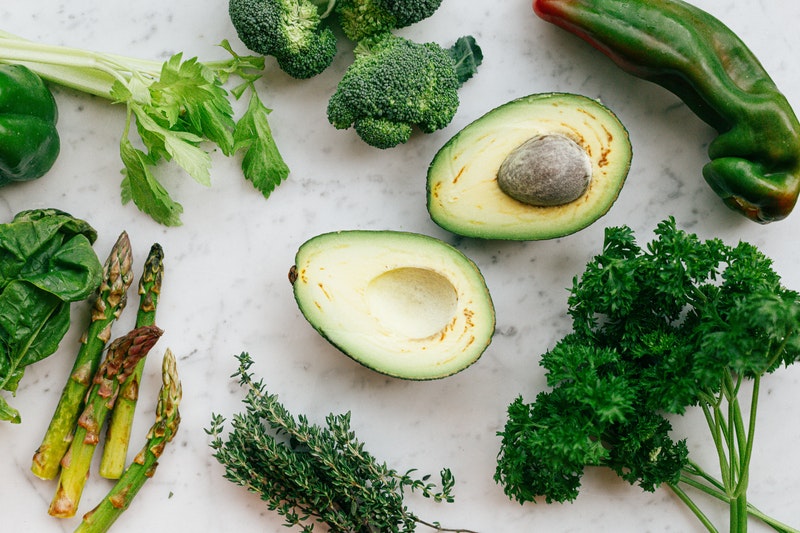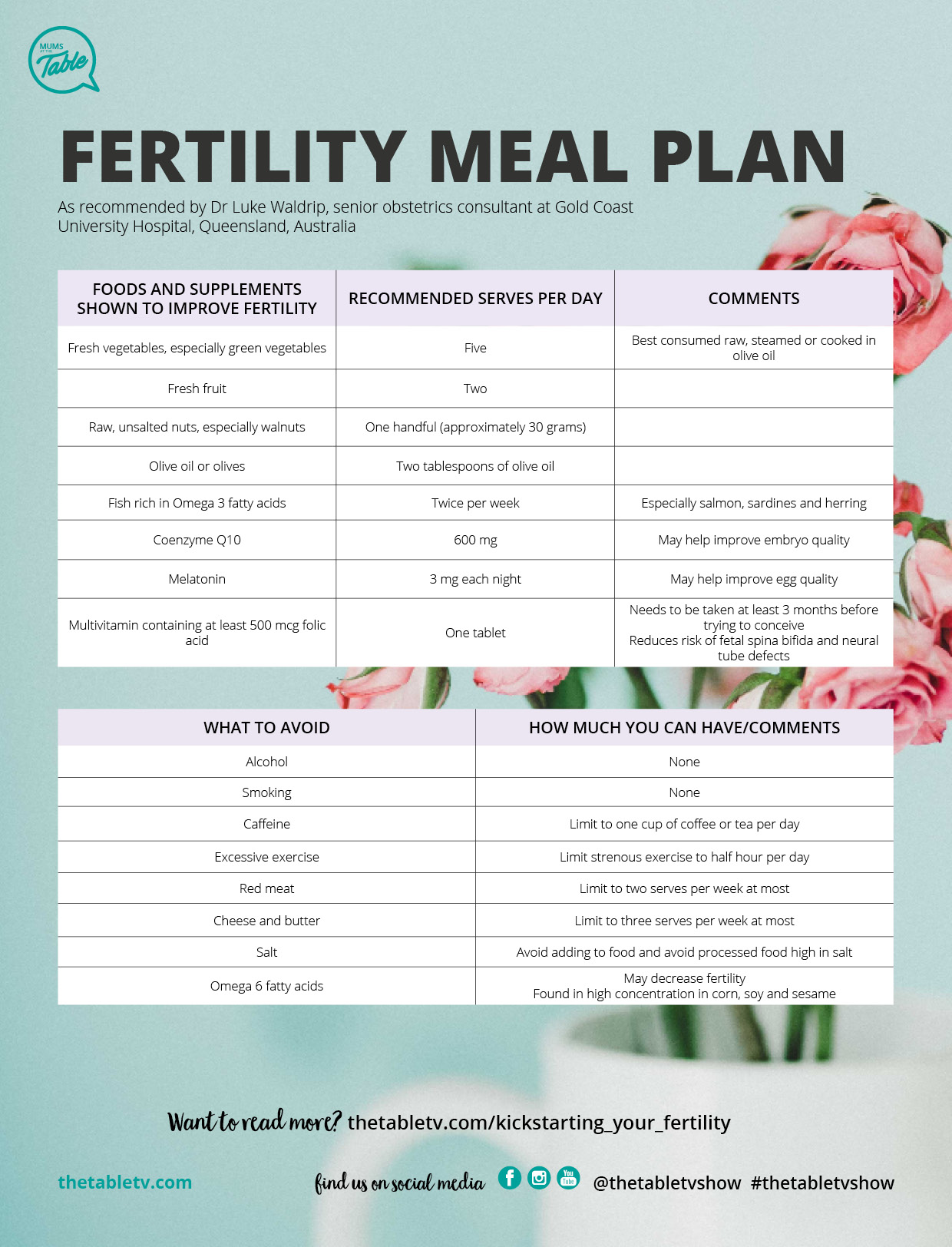Just because you fell pregnant once doesn’t mean it’ll easily happen again. However, there are ways you can support your reproductive health for a better chance at kickstarting your fertility. Also, read on to find out how to download your free meal plan to help increase your chances of falling pregnant.
Early-morning sun angled in through the window, casting a warm line across the floor of the procedure room. It caught the back of my infertility specialist’s head and shoulders, making the edges of his black hair glow grey.
“I’m sorry,” he said, glancing down at the printout he held in his hand. “All of your embryos were abnormal.”
I blinked. “What do you mean?” I said.
“It’s the chromosomes,” the doctor said. “There needs to be 23 normal pairs.”
“None of the embryos are normal?” I asked.
“That’s correct,” the doctor said. “It’s not that uncommon for some embryos to be abnormal. But when you’re over 35, the odds of there being abnormalities increase substantially.”
“Could it be my sperm quality?” my husband asked.
The doctor shook his head.
“It’s the eggs,” he said, keeping his eyes on me.
Losing the war on my fertility journey
In the war against time, I had lost a key battle. A woman’s fertility starts to decline after the age of 30 and falls exponentially after the age of 38. The Gynecological Endocrinology Journal reports that a 29-year-old woman has a 40 per cent chance of falling pregnant through assisted reproductive technology. By the age of 36, it has dropped to 32 per cent and, by the age of 46, it is almost zero. Under natural conditions, the same pattern follows. Each month, a 30-year-old woman has a 20 per cent chance of conceiving, but once you hit 40, that chance has shrunk to five per cent.
I had been on the pill until the age of 34. When I finally stopped taking it, I didn’t get a period for over a year. It took the drug Clomid to kickstart my ovaries again. Thankfully, I gave birth to my daughter a year later.
The second time around, however, things weren’t going to plan.
Dr Nat Kringoudis is a Chinese medicine specialist, acupuncturist and natural fertility educator. She says that taking the contraceptive pill can put our reproductive hormones “offline”. It can also deplete our body of essential vitamin and mineral stores as well as being detrimental to our gut microbiome.
Her advice for women who have been on the pill is to start supporting your body. Much of this simply starts with having a healthy balanced diet. “There’s nothing you need to ‘wait’ for,” she says. “Gut health is paramount, as well as cutting down on stress.”
Dr Nat says that fertility is an extension of our health and we need to appreciate it more. “It isn’t a switch that is turned on when we are ready, it’s something we need to nurture. It’s what you do each and every day that counts. Reclaiming fertility doesn’t have to be torturous.”
How to give your body the best chance for kickstarting your fertility

Dr Alex Polyakov is a fertility specialist based in Melbourne. He agrees that a healthy lifestyle is the best thing we can do to support our fertility, which includes having a healthy weight.
“My advice is always to have a normal BMI (body mass index), do moderate exercise, have a healthy diet and avoid smoking, drinking and environmental toxins,” he says. “Most people would get enough nutrients from their diet but if they are vegetarian or if they have allergies, or they don’t eat certain things, then they may not. So I would always recommend a multivitamin as well as an iron and folic acid supplement.”
Dr Alex says there is good evidence that the quality of eggs in women who are Vitamin D deficient can be impaired. So he also advises women to take a Vitamin D supplement, get some exposure to natural sunlight and eat foods that are high in Vitamin D such as salmon, sardines, spinach and kale.
The most important factor affecting fertility and the quality of a woman’s eggs, however, he says, is their weight. “People are often overweight and this has a huge impact on fertility. Women underestimate how detrimental weight gain is to the quality of their eggs.”
Two supplements that can improve fertility
Dr Norbert Gleicher, medical director and chief scientist at The Center for Human Reproduction in New York, USA, has more than 40 years’ experience as an obstetrician and gynaecologist. He is also considered a luminary in reproductive endocrinology and infertility.
He believes a woman can improve her fertility health by combining two key supplements: dehydroepiandrosterone (DHEA) and Coenzyme Q10 (CoQ10).
DHEA is a hormone produced by the adrenal glands which the body converts into testosterone and oestrogen. CoQ10 is a compound that produces energy in cells and serves as an antioxidant and whose age-related decline appears to effect egg quality.
“DHEA and CoQ10 have been an integral part of our centre’s success with women with low ovarian reserve, whether due to premature ovarian ageing among young women or due to age,” he says. “We recently had a patient who delivered a healthy baby. She was just two months shy of 48 when she had her IVF cycle, and we believe she is the oldest woman who has delivered after an IVF cycle with her own eggs.”
In a 2015 study involving more than 10,000 fertility treatment cycles, researchers found that combining DHEA and CoQ10 supplementation significantly increased ovarian responsiveness. This was backed up by another study in 2016 involving 330 intrauterine insemination cycles and 78 IVF cycles, which again showed that supplementing with both DHEA and CoQ10 significantly improved the response of the ovaries.
In Australia, CoQ10 can be easily purchased from most pharmacies and health supplements’ stores. DHEA, on the other hand, is a prohibited substance under Australian Customs legislation and can only be obtained in Australia if it’s prescribed by a doctor and made up by a compounding pharmacist.
It’s time to be proactive about kickstarting your fertility
First-time older mother Carmella Lee, 43, is thankful she was proactive about her fertility. Despite suffering from severe endometriosis and having only one functional ovary at the age of 41, she credits taking CoQ10 with helping her with a healthy conception on only her second IVF cycle with her now one-year-old daughter.
“I believe couples need to do their own research into how to improve their fertility, and we are fortunate to have access to forums, articles, websites and support groups,” she told me. “I read a lot of forums and websites about improving fertility and egg quality, and whilst there was quite a list of supplements which people take, I was only keen to take those which had some evidence.”
Three months after my own devastating news I found myself standing in the neighbourhood playground, staring out at the river’s waters. Sun speckled off the wavelets created by a passing speedboat, casting bursts of candlelight-like glow over the nearby trees and my daughter’s strawberry-blonde curls.
“Faster Mum-mum, faster,” she told me sternly, detecting a lull in the swing’s momentum.
“Sorry darling,” I said, giving the black rubber harness a gentle shove. “I was busy daydreaming.”
“What’s day –” my daughter paused.
“Daydreaming,” I said, giving her swing another push. “It means thinking.”
And as I stood there, gently propelling my daughter back and forth, I kept thinking, while the chain links squeaked and the children shouted. I thought about the line of bottles on my pantry shelf. The multivitamins, the Vitamin D, the DHEA and the CoQ10. I thought about the salmon and Greek salad I was planning for dinner. I thought about the half-an-hour of treadmill time I was going to have to squeeze in after putting my daughter to bed. I thought about the line of Gonal-F injection pens sitting in my fridge, waiting for my next IVF cycle to begin.
I thought about how, although it wouldn’t be the end of the world if I didn’t have a second child, I still wanted one. And while my ovaries were still producing eggs I shouldn’t give up hope.
FREE PRINTABLE!

How helpful was this article?
Click on a star to rate it!
0 / 5. 0
Be the first to rate this post!
Suvi Mahonen
Related posts
Subscribe
Receive personalised articles from experts and wellness inspiration weekly!

